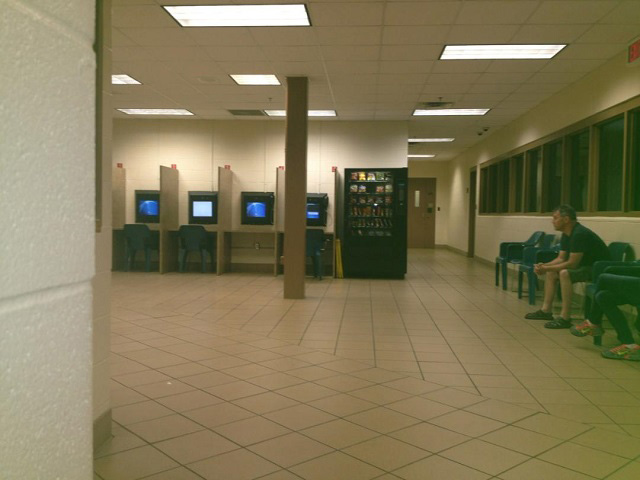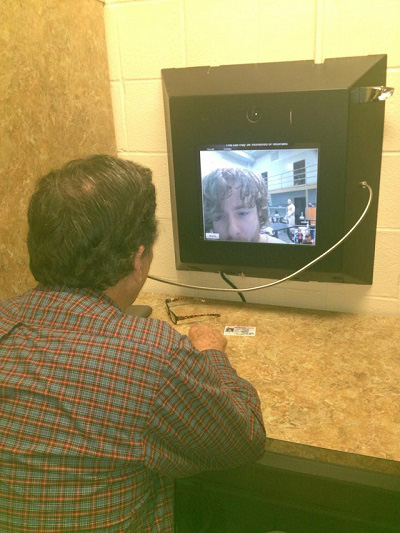Anyone who has had a loved one locked up knows it’s not easy. But I didn’t realize how much it would feel like being kicked while you’re already down. My brother has been incarcerated in a county jail in southern Indiana since December 2015, and has yet to be convicted. Trying to support him has been an uphill struggle.
The first kick came when I learned that my parents and I can’t even see my brother face-to-face. Instead, my parents and I are forced to go to the jail to “visit” through video. The jail doesn’t see the difference, but looking at his face through a tiny scratched up screen, through which eye contact is impossible, can only be called a “visit” with the best of imaginations.
According to the criminal legal system research nonprofit, Prison Policy Initiative, hundreds of jails nationwide, persuaded by private tech companies hawking their new product, have given in to this same harmful thinking to largely eliminate in-person visitation.
But these jails are ignoring how much this video “innovation” fails. On Christmas, I saw a family arrive with young children dressed up in their finest attire to visit their incarcerated parent. What did they get for choosing to spend their Christmas in a jail? The visit was cut short to three minutes because of technical glitches. It was heartbreaking.
 In order to visit a loved one free of charge, families must arrive in-person at the jail and “visit” using a video kiosk. (Photo: Courtesy of Emily Pollom)
In order to visit a loved one free of charge, families must arrive in-person at the jail and “visit” using a video kiosk. (Photo: Courtesy of Emily Pollom)
The sad truth is we’re lucky when our visits happen at all. Despite the fact that visitors must schedule video visits 24 hours in advance, visits are canceled at the last minute. Sometimes the internet goes out at the jail. Other times, my brother is in a different part of the jail and no one cared to move him to the area where he can receive video calls.
I’m doing everything I can to stay in touch with my brother, but it often feels like everyone involved is trying to take advantage of our family’s hardship. Once, I received an email with the subject line telling me that my brother needed help. My pulse went through the roof. “Is he hurt?”I thought. I opened the email to find it was a marketing strategy that JailATM uses to prey on vulnerable families. It was asking me to purchase a “Gold Access Pass” so that my brother could have greater email access and entertainment options. JailATM should think twice before using triggering marketing tactics to sell its product.
The funny thing is that, on paper, I am the perfect customer for JailATM. I work as a field biologist and move each season, so visiting in-person is difficult. Each week, I send my brother four letters in the mail and a couple emails at fifty cents a pop. At-home video visitation, another product offered by JailATM, should be a great way for me to stay connected, but it’s not easy to get yourself to spend hard-earned money on high-cost, low-quality products.
Video visitation could be a win-win-win for families, companies and correctional institutions if technology improves and prices are kept low. It could make it easier for incarcerated persons to connect with their young children and family members who live far away. However, it should be a supplemental option to in-person visitation, not a replacement.
The good news is the Federal Communications Commission (FCC) is trying to protect family members like me from paying too much to companies that don’t deserve our money. The FCC approved strong regulations of the related prison and jail phone industry — which charges $1 per minute for phone calls — and requested comment on video visitation last October. Unfortunately yet unsurprisingly, the companies challenged the phone rate caps in court, and the court has temporarily blocked parts of the regulations.
As our country questions whether incarceration is the best way to rehabilitate, can we really justify punishing not only incarcerated people, but their families too? It’s time for the Federal Communications Commission to protect captive customers.
Join us in defending the truth before it’s too late
The future of independent journalism is uncertain, and the consequences of losing it are too grave to ignore. To ensure Truthout remains safe, strong, and free, we need to raise $50,000 in the next 10 days. Every dollar raised goes directly toward the costs of producing news you can trust.
Please give what you can — because by supporting us with a tax-deductible donation, you’re not just preserving a source of news, you’re helping to safeguard what’s left of our democracy.
